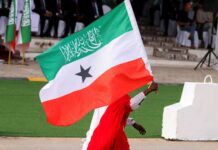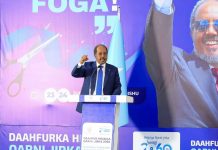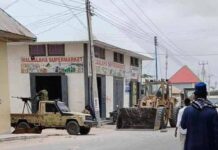MOGADISHU (Somaliguardian) – Somalia’s former President Mohamed Abdullahi Farmajo and incumbent President Hassan Sheikh Mohamud have exchanged pointed remarks over an escalating poverty crisis in Mogadishu, after Farmajo made his first public appearance since losing the 2022 election.
Speaking on Saturday to a group of MPs in the capital, Farmajo – who returned to Mogadishu earlier this month – warned that the city was facing a dire humanitarian situation, claiming many residents could no longer afford even a single daily meal.
“I have researched this thoroughly and found that the country is in a severe crisis,” he told lawmakers. “People are talking about levels of hardship that some of you may not be aware of. Many citizens eat only one meal a day – or once every two days.”
His remarks spread widely on Somali social media, with many users echoing the concerns and accusing the current government of mismanagement. Residents interviewed by local media said life had been more affordable during Farmajo’s presidency and that their economic situation had deteriorated sharply in recent years.
Mohamud Acknowledges Hardship but Defends Security Gains
President Hassan Sheikh Mohamud, speaking later the same day without naming his predecessor, acknowledged rising poverty in the capital but pushed back against suggestions that the government was unaware or disengaged.
“There is hunger, and there is poverty,” he said. “But that does not mean the government and its institutions are unaware of the challenges.”
He added that Mogadishu remained “a secure city – by the grace of Allah – comparable to other major capitals around the world, and among the safest.”
The exchange comes amid prolonged complaints from Mogadishu residents about soaring living costs, high unemployment, inflation, and rising food and rental prices. Many blame the government for failing to stabilise the economy.
Past Remarks Fuel Anger
President Mohamud has previously faced public backlash after dismissing viral TikTok videos showing residents eating bread with water, insisting instead that the city’s economy was booming compared to the Farmajo era. He suggested that many of those complaining were beggars or individuals who had lost illegal income streams after the government cut tax-collection channels used by Al-Shabaab.
Evictions and Corruption Allegations Deepen Crisis
Economic hardship has also been compounded by government-led evictions that have displaced tens of thousands of people from informal settlements. Many evicted families say they are now forced to pay rent with money that previously covered food and education fees.
President Mohamud has repeatedly defended the demolitions, saying the government will continue clearing informal settlements until there are no slums in the city.
Amid rising allegations of corruption within government institutions, the president previously shrugged off criticism of media reports that he was constructing luxury homes, saying Somalis “have nothing to do with whether I build mansions or multi-storey buildings.”
More recently, Justice Minister Hussein Moalim triggered outrage after saying that citizens do not have a right to health care, education or other essential public services – a statement many viewed as evidence of the government’s misunderstanding of its responsibilities.
Responding on Saturday, Farmajo denounced the minister’s comments. “These services are the responsibility of the government,” he said. “It is unfortunate for a public official to make such remarks.”
Contact us: info@somaliguardian.com












